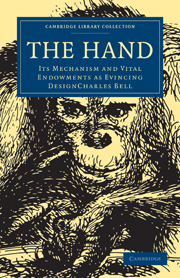Book contents
- Frontmatter
- PREFACE
- Contents
- CHAP. I INTRODUCTORY
- CHAP. II DEFINITION OF THE HAND
- CHAP. III THE COMPARATIVE ANATOMY OF THE HAND
- CHAP. IV OF THE MUSCLES OF THE ARM AND HAND
- CHAP. V THE SUBSTITUTION OF OTHER ORGANS FOR THE HAND
- CHAP. VI THE ARGUMENT PURSUED FROM THE COMPARATIVE ANATOMY
- CHAP. VII OF SENSIBILITY AND TOUCH
- CHAP. VIII OF THE SENSES GENERALLY INTRODUCTORY TO THE SENSE OF TOUCH
- CHAP. IX OF THE MUSCULAR SENSE
- CHAP. X THE HAND NOT THE SOURCE OF INGENUITY OR CONTRIVANCE, NOR CONSEQUENTLY OF MAN'S SUPERIORITY
- ADDITIONAL ILLUSTRATIONS
- APPENDIX
CHAP. VII - OF SENSIBILITY AND TOUCH
Published online by Cambridge University Press: 29 August 2010
- Frontmatter
- PREFACE
- Contents
- CHAP. I INTRODUCTORY
- CHAP. II DEFINITION OF THE HAND
- CHAP. III THE COMPARATIVE ANATOMY OF THE HAND
- CHAP. IV OF THE MUSCLES OF THE ARM AND HAND
- CHAP. V THE SUBSTITUTION OF OTHER ORGANS FOR THE HAND
- CHAP. VI THE ARGUMENT PURSUED FROM THE COMPARATIVE ANATOMY
- CHAP. VII OF SENSIBILITY AND TOUCH
- CHAP. VIII OF THE SENSES GENERALLY INTRODUCTORY TO THE SENSE OF TOUCH
- CHAP. IX OF THE MUSCULAR SENSE
- CHAP. X THE HAND NOT THE SOURCE OF INGENUITY OR CONTRIVANCE, NOR CONSEQUENTLY OF MAN'S SUPERIORITY
- ADDITIONAL ILLUSTRATIONS
- APPENDIX
Summary
We find every organ of sense, with the exception of that of touch, more perfect in brutes than in man. In the eagle and the hawk, in the gazelle and in the feline tribe, the perfection of the eye is admirable;—in the dog, wolf, hyæna, as well as in birds of prey, the sense of smelling is inconceivably acute ; and if we should have some hesitation in assigning a more exquisite sense of taste to brutes, we cannot doubt the superiority of that of hearing in the inferior animals. But in the sense of touch, seated in the hand, man claims the superiority ; and it is of consequence to our conclusion that we should observe why it is so.
It has been said that, accompanying the exercise of touch, there is a desire of obtaining knowledge ; in other words, a determination of the will towards the organ of the sense. Bichat says, it is active whilst the other senses are passive. This opinion implies that there is something to be understood—something deeper than what is here expressed. We shall arrive at the truth by considering that in the use of the hand there is a double sense exercised ; we must not only feel the contact of the object, but we must be sensible to the muscular effort which is made to reach it, or to grasp it in the fingers.
- Type
- Chapter
- Information
- The HandIts Mechanism and Vital Endowments as Evincing Design, pp. 150 - 170Publisher: Cambridge University PressPrint publication year: 2009First published in: 1833

